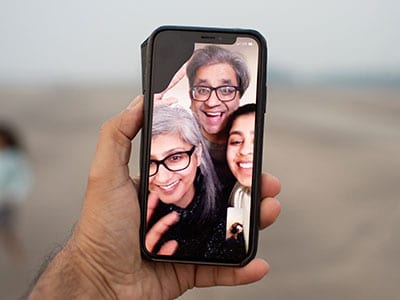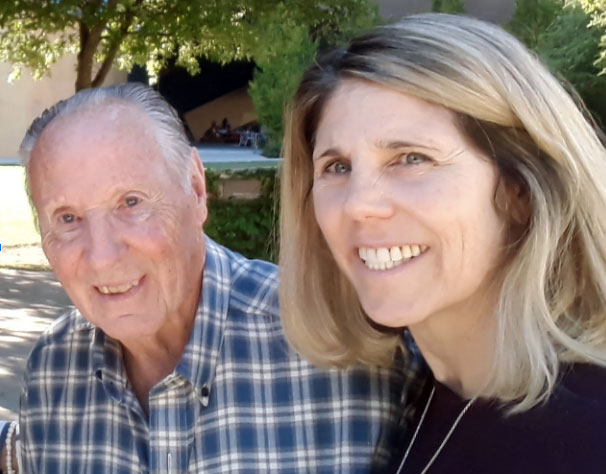This year, shifting family time to a digital space keeps older relatives safe while including them in the festivities — but just like real-life family get-togethers, it could also feel chaotic. Experts share ways to make sure this year’s holiday video visit is fun for all — including those living with conditions like Alzheimer’s.
The holidays are going to look a little different this year.
As the coronavirus pandemic continues to surge across the country, many families are making plans to gather… digitally. Especially for older adults, many of whom have been isolated since the spring, visiting with their loved ones face to face, screen to screen, couldn’t be more important. But with technology learning curves and the potential chaos and cross-talk of big group video events, it could be frustrating too.
Here are some ways to help make sure a family holiday Zoom event is inclusive of all.
1. Offer a Zoom crash course.
Whether it’s Zoom or another video platform of choice, getting set up for the first time can be a lot to juggle — even for the grandmother who is all over your Instagram.
At this point in 2020, many families are all too familiar with Zoom, but if your older relative is new to the world of group video calls, offer in advance to walk them through the steps of installing and using digital video tools, and try a test call. Refinery29 published a helpful guide to teaching grandparents to use Zoom for Passover and Easter — and it still holds up for Thanksgiving, Hanukkah, Kwanzaa, Christmas…
2. Get on the big screen.
If a larger screen — like a computer monitor — is available, help your family members plan in advance to set it up for the call. Older adults with vision problems or who have a hard time staying focused will be better clued in to the action.
3. Add a little structure.
By this point in the coronavirus pandemic, many of us have experienced a frenetic family or friend Zoom: the picture jumping from participant to participant, people talking over each other, toddlers shouting, awkward moments galore.
For older adults who are navigating hearing loss, or dealing with depression, neurodegenerative conditions, or a number of other health situations, it may be tough to follow, and tough to know how to take part.
For example, many families are navigating caring for a loved one with Alzheimer’s or a related dementia: Worldwide, between 5 and 7 percent of people aged 60 or older are living with Alzheimer’s or another form of dementia, and by the age of 85, that likelihood jumps to between 25 and 50 percent. This holiday and year-round, more than half of older adults in long-term care homes are navigating dementia’s symptoms, which might include irritability, confusion, depression, apathy, trouble with communication and language, and a number of other behavioral changes in addition to the well-known issue of memory loss.
Sarah Dulaney, a nurse coordinator at University of California San Francisco’s Care Ecosystem study, a remote dementia care coordination program, said video calls that feel hectic could also be overwhelming for adults living with symptoms of Alzheimer’s and dementia.
“In general, it can be hard for people with dementia to follow group conversations,” Dulaney said. “They can sit back and be more observant. So, even for in-person celebrations, they may not be participating in conversations as much as others.” Translate that multi-person conversation to the digital space, and it gets all the harder to follow — and potentially, all the more confusing.
Rosie Hunter, a clinical psychologist, has written up a guide for adding structure to family Zoom calls, including advice like designating a host who introduces each participant and unmutes speakers as they talk.
Meanwhile mother.ly offers a list of activities for Zoom calls between children and older family members, some of which could fit right in on Thanksgiving or Christmas — like baking a simple recipe.
4. Keep calls short, simple and sweet.
Dulaney adds that video calls that drag on for a while or feel too hectic could also be unpleasantly overwhelming — especially for adults living with symptoms of Alzheimer’s and dementia. But shorter, simpler video visits, she suggested, could help.
“It’s important to try to help people with dementia participate as much as they can — and also recognize when they need rest,” Dulaney told Being Patient in a recent interview. She suggests breaking a big and potentially overstimulating video call into shorter ones, 15 to 30 minutes or so, with just a few participants each.
Likewise, on a whole-family call, Hunter recommends establishing a time limit. “People feel rude leaving Christmas dinner too early,” she writes, “but if it drags on, they are less likely to come back next year!”
5. Manage your expectations.
No matter how incredible your family video event may be, it’s no stand-in for in-person time together. Managing expectations is another good step in family Zoom prep — and for families of people living with dementia, this is all the more important.
According to Alzheimer’s Association Northern California and Nevada Chapter Executive Director Elizabeth Edgerly, people with dementia may struggle to comprehend a video call, and families and friends should prepare for the possibility they will not be engaged.
Even if they ultimately decline to participate, Edgerly said “it still may be nice to connect with [a] caregiver, just to find some ways to join together as a family.”
6. Think outside the Zoom box.
Zoom isn’t the be-all, end-all. Dulaney points out that some people, like those living with Alzheimer’s or a related form of dementia, may have difficulty communicating over the phone, and suggests that friends and family could find another way to send memories and expressions of things they’re grateful for.
For example, families could send pre-recorded video messages, or even record clips and string them together into one video using digital platforms like Tribute, to a loved one.
“It doesn’t have to have a long heartfelt monologue,” Dulaney said of sending written messages in lieu of a call. “If it has a funny picture or refers to a shared memory that they might relate to, it can really be significant.” The shared moment may not be unfolding in real time, but Dulaney said video messages help remind loved ones who can’t be physically present that they are connected and loved.
7. See what works best.
Dr. Helen Fernandez, professor of geriatrics and palliative medicine at Icahn School of Medicine at Mount Sinai, said in an interview with Being Patient about including family members with dementia in holiday celebrations, there is no one right way to handle distanced, digital family holidays this year.
“We’re adapting as we go through all of this,” she told Being Patient. “You can work [with] what’s best for your loved one. You can try something, and if it doesn’t work, you can adjust. It might be better doing a phone call, instead of Zoom. Maybe it’s better just to hear a voice instead of seeing the face, and that’s okay.”
Additional reporting by Nicholas Chan





The comment about a parent with Alzheimer’s having difficulty getting some words out made me wonder if my experience might help. I am 89yrs. w/o dementia who occasionally has trouble remembering a word. I take Choline & Inositol (minor B vitamins) and find it helpful. As a former RD, CN I felt it was a safe product. At least 500mg 2x a day could be tried for a month or so to see if there is any improvement. Of course check with their physician. The capsules are large. Start with one and increase. I have no idea what if any research has been done.